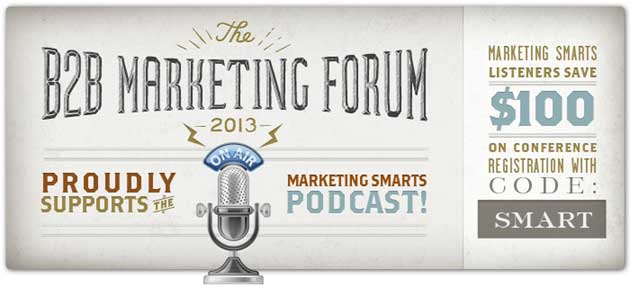Jonah Berger is an associate professor of marketing at the Wharton School of Business at the University of Pennsylvania. His research has been published in top-tier academic journals, and popular accounts of his work have appeared in the New York Times, the Wall Street Journal, Science, Harvard Business Review, and other publications. His research has also been featured in the New York Times Magazine’s "Year in Ideas." Berger has been recognized with awards for both scholarship and teaching.
Don't miss a MarketingProfs podcast, subscribe to our free newsletter!
I invited Jonah to Marketing Smarts to talk about his bestselling book, Contagious: Why Things Catch On.
Here are just a few highlights from our conversation about creating contagious content:
Don't call it "viral"—marketing is about much more than online content (2:10): "It's all about how you get people to share things, whether via word-of-mouth, whether online or offline, or just by imitation, by seeing someone doing something making people more likely to do it. So, the book is all about social influence, and how to use social influence to help you grow your business. Viral's a part of the book, but it's not all of the book...only about 7% of word-of-mouth is online. Most word-of-mouth is actually offline, face to face."
"Contagious" marketing is like Moneyball (4:03): "When we think about viral, we often think about home runs, millions of views, but really a better analogy is baseball. When you're a hitter in baseball, you don't hit a home run every time, but if you understand the science of hitting, you can increase your average. You can hit more home runs, but also more singles, more doubles and more triples. And that's the goal here. Viral isn't luck and it's not chance, but...even 5,000 shares or 1,000 or just getting one person to tell two people instead of just one is not luck and it's not chance, there is science behind it. So, you can design content or craft content to be more contagious, whether 10 million people look at it tomorrow, I can't guarantee that, but I can guarantee that if you understand the science, more people will share it ."
Word-of-mouth doesn't necessarily involve something outrageous (5:46): People talk more about Cheerios than Disney World, and we couldn't figure out why originally. Cheerios is a super mundane product... Why would it get more world of mouth than Disney, which is a really engaging emotional experience? Word-of-mouth is more complicated than just talking about things that are funny or that make us look good... There are a lot of other drivers for sharing that often get less attention."
B2B marketers can use word-of-mouth, too (14:14): "I recently spoke at an orthodontics conference, and most of us never think about our orthodontist, but there was a great example someone showed me of this screw that...an orthodontist could put in a patient's mouth. A guy showed it in a remarkable way: He showed you that he could put the screw in his own mouth by just looking in a mirror. That's how simple this screw is to install. Now, for most of us, we could care less about a dental screw, yet this thing has tens of thousands of views and it's totally a B2B product.... By making it remarkable, they got people to talk."
Word-of-mouth gives small businesses more bang for their marketing buck (23:00) "I think marketers are so used to spending money on advertising, and while advertising can be helpful, it's often much more expensive and much less cost-effective than word-of-mouth. Word-of-mouth is over 10 times as effective as traditional advertising. People trust it more, and it's more targeted. It's a much better way, particularly for small businesses, to reach new people; but to make that work, you have to turn those customers in to advocates. You have to get them to talk about you. And that's what contagious is all about: the science behind word-of-mouth that companies can apply to get more people talking about them."
If your product or cause is difficult for consumers to talk about, build "observability" into your marketing (28:15): "In terms of prostate cancer, there's a great example called Movember...where rather than having people run a 5K...they encourage men to grow mustaches in the month of November, and the reason that is such a genius campaign is they made the private public. Donation behaviors or diseases are often a very private thing that no one wants to talk about. They created a public signal (a mustache) of an otherwise private conversation. So now, if someone walks into your office in November with a big mustache, you're going to ask them...what's going on... and then you've started a conversation about something that might otherwise have been difficult to talk about. Movember's now raised hundreds of millions of dollars in dozens of countries across the world. The key is to make the private public, to make it easier for people to see what others are doing."
For more information, visit www.JonahBerger.com or follow him on Twitter: @j1berger.
Jonah and I talked about much more, so be sure to listen to the entire show, which you can do above, or download the mp3 and listen at your convenience. Of course, you can also subscribe to the Marketing Smarts podcast in iTunes or via RSS and never miss an episode!
Marketing Smarts is brought to you by the MarketingProfs B2B Forum, taking place October 9-11 in Boston, Massachusetts. The 7th Annual B2B Marketing Forum is the premier event for B2B marketers worldwide. This two-day event is packed with 42 sessions, 4 keynotes, tons of networking opportunities, a lot of fun, and more B2B business smarts than you'll find anywhere else this year. Marketing's full of choices. Choose B2B.
BONUS: Use code "SMART" to get $100 off registration at mprofs.com/b2bsmart!
Music credit: Noam Weinstein.
...sign up for free to continue reading
Don't miss a MarketingProfs podcast, subscribe to our free newsletter!
Published on September 11, 2013





 Jonah Berger, associate professor of marketing at the Wharton School at the University of Pennsylvania, and author of the bestselling book Contagious: Why Things Catch on.
Jonah Berger, associate professor of marketing at the Wharton School at the University of Pennsylvania, and author of the bestselling book Contagious: Why Things Catch on.
